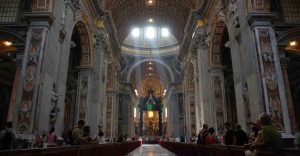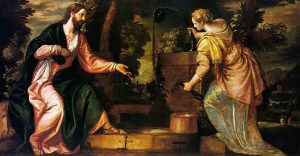It is important to understand that sin and God’s holiness are incompatible. There is a radical conflict between the total and infinite purity, goodness, perfection and holiness of God, and the horrid, empty, constrictive and dark nature of sin. Every sin is an attack against God, his purity, holiness and truth. At the heart of sin is always a disordered self-love, a pride which seeks to suppress the truth about God and supplant the Creator with the creature.
Homilies
Second Sunday of Lent: The Transfiguration Offers a Window Into Your Future
The season of Lent is ordered toward finding new life in Christ. And there are indeed very great promises attached to this new life! St. Paul teaches that we await our Savior, who will “change our lowly body to conform with his glorified body” (Phil. 3:21). He is here speaking of the second coming of Christ and the general resurrection of the dead. That is the great hope to which Lent directs us: the resurrection of Christ on Easter Sunday, which foreshadows that moment at the end of history when we too shall be raised from the dead by Christ.
Faithful Observance of the Commandments
In order to pursue the good wholeheartedly, it is necessary to truly love the good, to see it as a highly desirable treasure. The ancient philosopher Plato understood that if we love the good, our emotions and dispositions will move toward it spontaneously and with a sense of delight.
The Catholic Church: Not an Endeavor of Human Origin
The plan of God cannot be undone. The words of Gamaliel in reference to the apostles, their successors and their mission in the Church, continue to echo throughout the centuries: “For if this endeavor or this activity is of human origin, it will destroy itself. But if it comes from God, you will not be able to destroy them; you may even find yourselves fighting against God” (Acts 5:38-39). The continuity and permanency of the Church cannot be explained in any other way but by her origin in her divine and human founder: Jesus Christ.
Third Sunday of Lent: Come to the Well of Jesus and Drink Living Water
On this Third Sunday of Lent the first reading from Exodus (17:3-7) recalls Israel’s journey through the desert. In many ways, the journey of Israel toward the Promised Land is presently our own journey. As Israel thirsted, so too do we thirst, although perhaps in a different way and for different reasons. The people Israel frequently fell into unfaithfulness, idolatry, and distrust in God. Do we not do the same types of things? Even so, driven by divine love, God continued to lead his people toward the Promised Land, as he does with us, which is in fact not merely a place to put up shelter, nor a plot of ground upon which to temporarily live, but is a Person: Jesus Christ.




